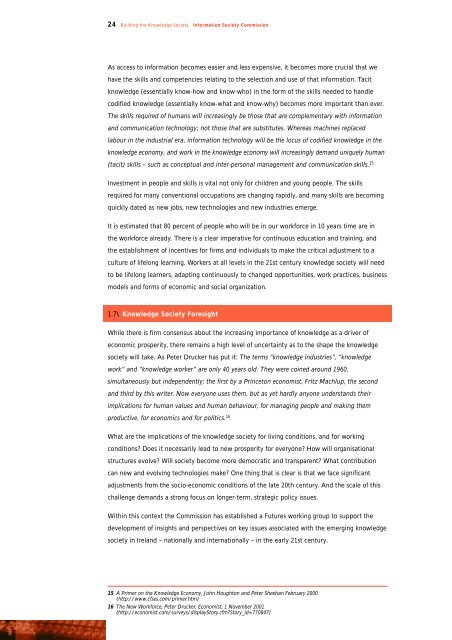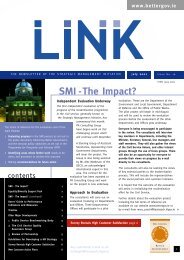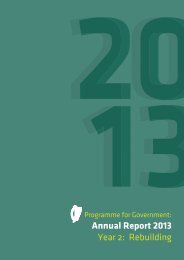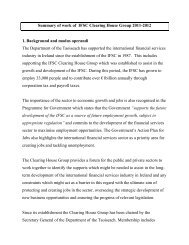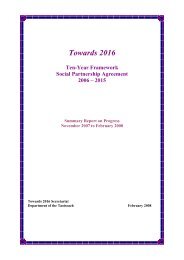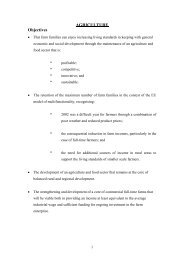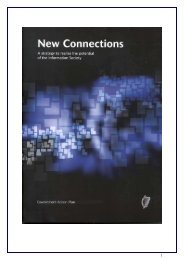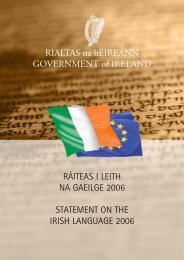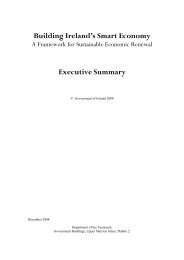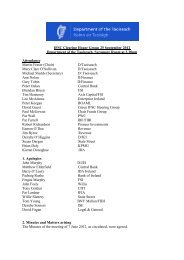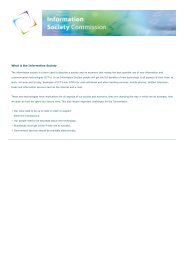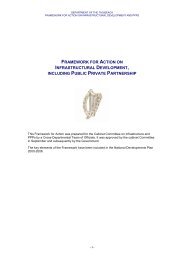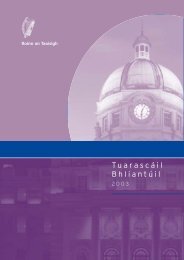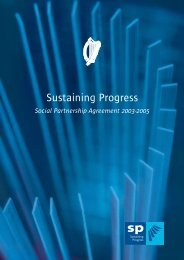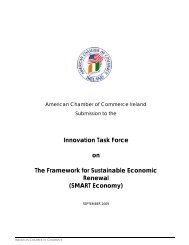Building the Knowledge Society - Department of Communications ...
Building the Knowledge Society - Department of Communications ...
Building the Knowledge Society - Department of Communications ...
Create successful ePaper yourself
Turn your PDF publications into a flip-book with our unique Google optimized e-Paper software.
24 <strong>Building</strong> <strong>the</strong> <strong>Knowledge</strong> <strong>Society</strong> Information <strong>Society</strong> CommissionAs access to information becomes easier and less expensive, it becomes more crucial that wehave <strong>the</strong> skills and competencies relating to <strong>the</strong> selection and use <strong>of</strong> that information. Tacitknowledge (essentially know-how and know-who) in <strong>the</strong> form <strong>of</strong> <strong>the</strong> skills needed to handlecodified knowledge (essentially know-what and know-why) becomes more important than ever.The skills required <strong>of</strong> humans will increasingly be those that are complementary with informationand communication technology; not those that are substitutes. Whereas machines replacedlabour in <strong>the</strong> industrial era, information technology will be <strong>the</strong> locus <strong>of</strong> codified knowledge in <strong>the</strong>knowledge economy, and work in <strong>the</strong> knowledge economy will increasingly demand uniquely human(tacit) skills – such as conceptual and inter-personal management and communication skills. 15Investment in people and skills is vital not only for children and young people. The skillsrequired for many conventional occupations are changing rapidly, and many skills are becomingquickly dated as new jobs, new technologies and new industries emerge.It is estimated that 80 percent <strong>of</strong> people who will be in our workforce in 10 years time are in<strong>the</strong> workforce already. There is a clear imperative for continuous education and training, and<strong>the</strong> establishment <strong>of</strong> incentives for firms and individuals to make <strong>the</strong> critical adjustment to aculture <strong>of</strong> lifelong learning. Workers at all levels in <strong>the</strong> 21st century knowledge society will needto be lifelong learners, adapting continuously to changed opportunities, work practices, businessmodels and forms <strong>of</strong> economic and social organization.1.7\ <strong>Knowledge</strong> <strong>Society</strong> ForesightWhile <strong>the</strong>re is firm consensus about <strong>the</strong> increasing importance <strong>of</strong> knowledge as a driver <strong>of</strong>economic prosperity, <strong>the</strong>re remains a high level <strong>of</strong> uncertainty as to <strong>the</strong> shape <strong>the</strong> knowledgesociety will take. As Peter Drucker has put it: The terms “knowledge industries”, “knowledgework” and “knowledge worker” are only 40 years old. They were coined around 1960,simultaneously but independently; <strong>the</strong> first by a Princeton economist, Fritz Machlup, <strong>the</strong> secondand third by this writer. Now everyone uses <strong>the</strong>m, but as yet hardly anyone understands <strong>the</strong>irimplications for human values and human behaviour, for managing people and making <strong>the</strong>mproductive, for economics and for politics. 16What are <strong>the</strong> implications <strong>of</strong> <strong>the</strong> knowledge society for living conditions, and for workingconditions? Does it necessarily lead to new prosperity for everyone? How will organisationalstructures evolve? Will society become more democratic and transparent? What contributioncan new and evolving technologies make? One thing that is clear is that we face significantadjustments from <strong>the</strong> socio-economic conditions <strong>of</strong> <strong>the</strong> late 20th century. And <strong>the</strong> scale <strong>of</strong> thischallenge demands a strong focus on longer-term, strategic policy issues.Within this context <strong>the</strong> Commission has established a Futures working group to support <strong>the</strong>development <strong>of</strong> insights and perspectives on key issues associated with <strong>the</strong> emerging knowledgesociety in Ireland – nationally and internationally – in <strong>the</strong> early 21st century.15 A Primer on <strong>the</strong> <strong>Knowledge</strong> Economy, John Houghton and Peter Sheehan February 2000(http://www.cfses.com/primer.htm)16 The New Workforce, Peter Drucker, Economist, 1 November 2001(http://economist.com/surveys/displayStory.cfm?Story_id=770847)


